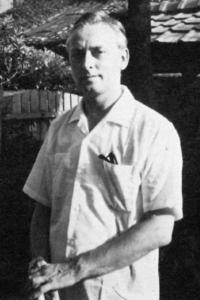 |
The Pole and Whistle
Four Square, London, 1966
The blurb on the back:
All his adolescent and young adult life, John Anselm carried with him the burden of his guilt. Unable to confide in his family, afraid to make friendships with girls, he was forced to conform to the frustrating standards of his surroundings.
Now this one's a bit obscure. Until the Knitting Circle site (see link below) produced a biography of George Moor, I knew nothing at all about either the book or its author. But it's actually very good indeed. Set in a fictitious Northern town named Hawkward (probably in Lancashire, I think), it's told in the words of a 25-year-old who lives a solitary life and works as a clerk in a chicken-rearing plant. Stopping off in a local pub, the Pole and Whistle, after work one evening, he finds himself drawn into a hard-drinking semi-criminal circle of young men, where homosexuality (and bisexuality) is accepted as being part of the natural order. He falls in love with one of these youths and begins to feel for the first time in his life that he belongs somewhere. The writing is sparse and lean, the story completely straightforward, and - impressively for the period - the tone avoids the twin perils of the salacious and the patronizing. In fact it's almost totally matter-of-fact:
In a novel about forbidden love - and this one makes clear that the secrecy necessitated by the law and social attitudes is the principal danger for gay men - it's always essential to suggest a promised land, where the living is, if not easy, then at least freer. In Forster's Maurice, for example, the English greenwood of mythology is celebrated as a haven for young lovers, echoing the role traditionally played by Arcadia. Here, the place of refuge turns out to be Japan. This is completely unexpected - in the 1960s Britain was knee-deep in pundits insisting that we needed to learn from the Japanese economic miracle, but I've never come across anyone suggesting that the country had anything to teach in terms of sexual diversity: that was always reserved for Scandinavia and Holland. My feeling is that it's drawn from personal experience, that George Moor (assuming that's his real name) is a British gay man who went to live in Japan, and that therefore much of the book is autobiographical in theme if not incident. Further evidence comes from the note at the beginning:
It's not standard practice in English fiction to explain the use of the first-person by reference to Japanese literary forms: Mr Moor must surely have direct experience of Japanese culture. He is, however, undoubtedly English - his awareness of the subtleties of class preclude any other conclusion. It's also worth pointing out that, though the novel was published in 1966, internal evidence suggests it was set much earlier. Four records are mentioned as being on the jukebox in the Pole and Whistle: Kenny Ball's 'Midnight In Moscow', Helen Shapiro's 'Walking Back To Happiness', Sam Cooke's 'Cupid' and an unnamed single by Chubby Checker (assumed to be his only big UK hit 'Let's Twist Again'). As a pop-literate person, you'll immediately recognize that these are not the sounds of 1966: it's possible that the jukebox includes a few oldies, but it seems too much of a coincidence that all four of these actually date from 1961. I think that this implies one of two things, either (a) the book was written earlier but remained unpublished until the social climate appeared to be on the move, or (b) again, the author was drawing fairly directly from an episode in his own life and identified the sounds he associated with the period. It's not exactly a classic but, in the almost total absence of any other popular gay fiction from the days before male homosexual activity was legalised, it's probably about as close as we've got. Time to stop neglecting it, I think.  George Moor from New Writing & Writers 13 (1976) George Moor. Visit that page and then visit the rest of the site.
ARTISTIC MERIT: 4/5
home |
